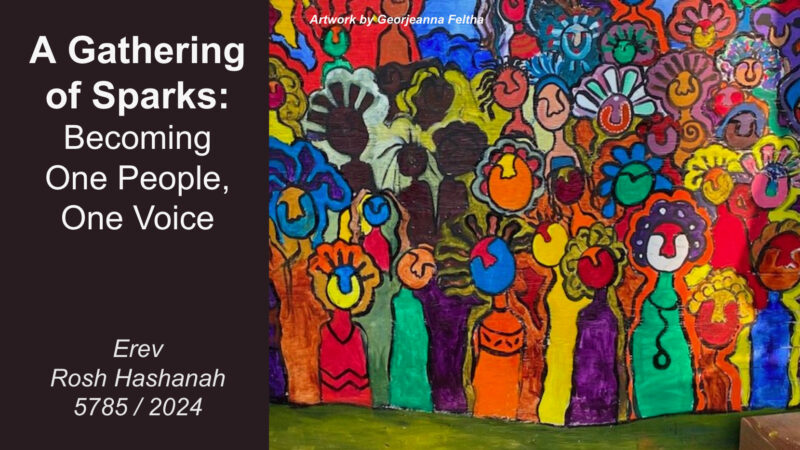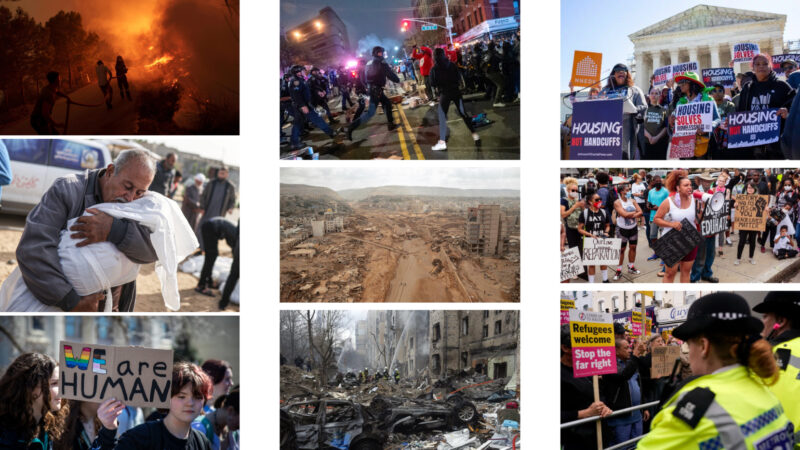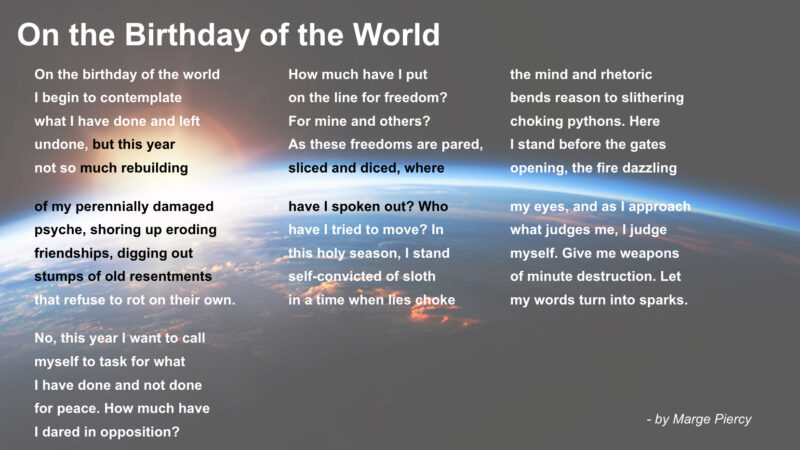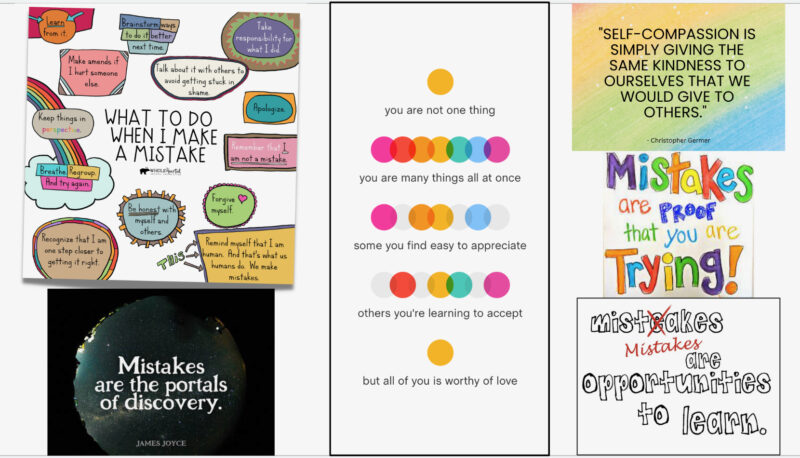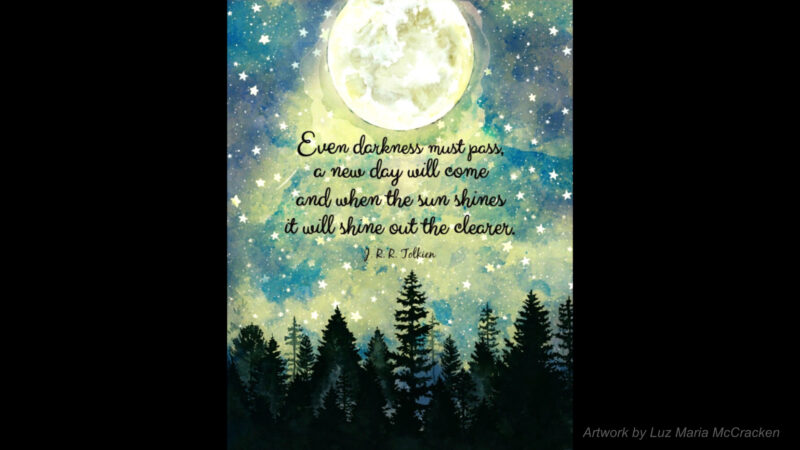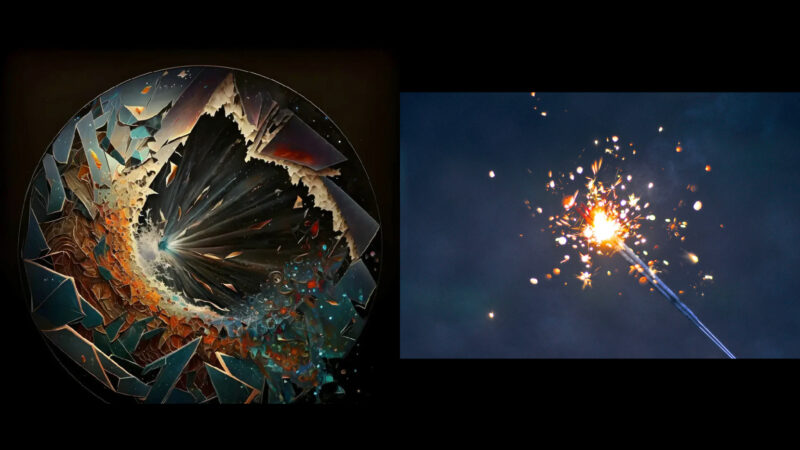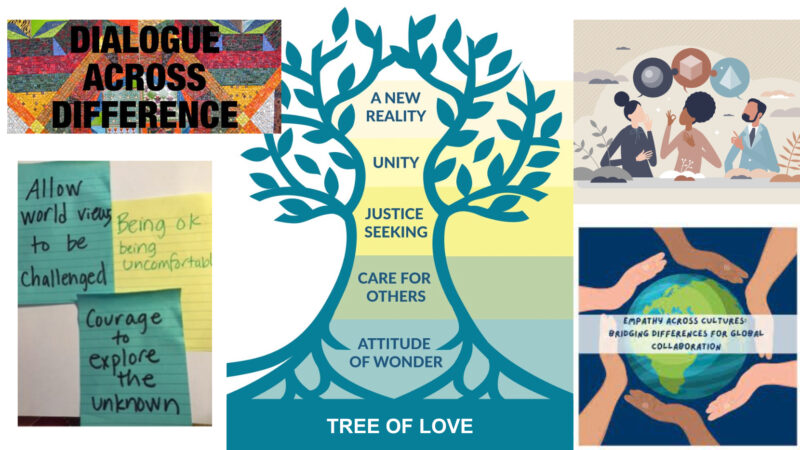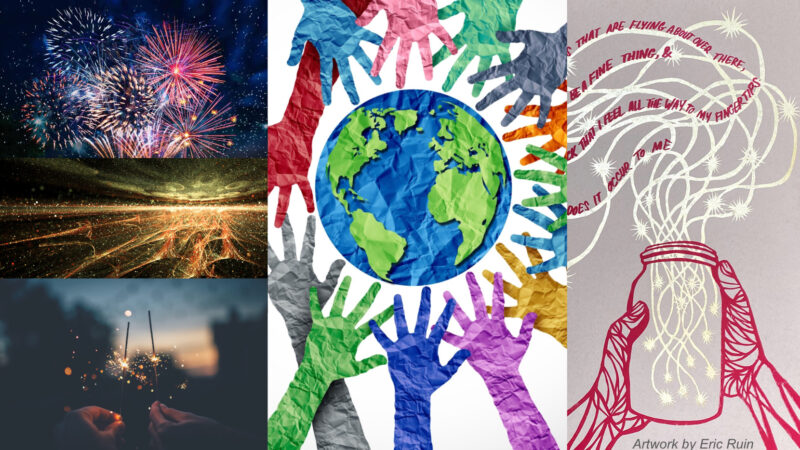The guest post below is the D’var Torah that CBI member & cantorial soloist Ziva Larson offered at Erev Rosh Hashanah Evening Service on Wednesday, October 2, 2024.
B’ruchim haba’im – welcome to all of you, both here at CBI and on Zoom. I am so grateful to be able to be in community with you during the High Holy Days this year.
As I sat at my desk in late August trying to write a D’var Torah for Rosh Hashanah, all that came to mind was: “I feel SO angry.” And to be honest, I still do. The anger feels like a giant boulder sitting on my chest or a roaring inferno exploding from my core. Rosh Hashanah is a holiday of creation, of life, of renewal, of joy, but, sometimes, all I can see around me is destruction and death, and all I can feel is fear, rage, grief, and despair.
I know I am not alone in these feelings. So much has happened over the past year – and continues to happen – that I feel like I am drowning, like the whole world is on fire, and that nothing I do – and nothing anyone does – will make any difference at all. How can I help repair the world when I feel so powerless? How can we repair the world when the people who hold positions of power abuse that power and either completely ignore those who are suffering around them or actively harm and even kill them?
This past year has seen conflicts, wars, and genocides on nearly every continent3,9,10; numerous environmental catastrophes as a result of climate change10,17; the continuing global rise of fascism5,10,15; the continued oppression and persecution of BIPOC7,10, LGBTQ+ people2,10,16, disabled people8,13, and unhoused people1; and many other devastating trends and events.
As we begin Rosh Hashanah and enter these Yamim Nora’im, these Days of Awe, is it any wonder that it might feel particularly hard this year to reflect on the past year? Is it any wonder that it might feel especially challenging to engage in cheshbon hanefesh – the accounting of our soul, the taking account of our successes and missteps? Is it any wonder that t’shuvah – the process of returning, of taking steps to return to our best self, finding answers to the question of what it means to be our best self – feels particularly overwhelming or even pointless?
When so much in this world feels so astronomically wrong right now, any attempt to reflect on those issues – and especially on our complicity in them – can feel massively overwhelming or even impossible. How can we survive such a harsh, painful, overwhelming endeavor? How do we avoid becoming incapacitated by the crushing weight of all that is wrong in the world, unable to take steps towards t’shuvah and tikkun olam, repairing the world?
These questions bring to mind a poem by Marge Piercy that I’d like to share with you. She writes:
On the birthday of the world
I begin to contemplate
what I have done and left
undone, but this year
not so much rebuildingof my perennially damaged
psyche, shoring up eroding
friendships, digging out
stumps of old resentments
that refuse to rot on their own.No, this year I want to call
myself to task for what
I have done and not done
for peace. How much have
I dared in opposition?How much have I put
on the line for freedom?
For mine and others?
As these freedoms are pared,
sliced and diced, wherehave I spoken out? Who
have I tried to move? In
this holy season, I stand
self-convicted of sloth
in a time when lies chokethe mind and rhetoric
bends reason to slithering
choking pythons. Here
I stand before the gates
opening, the fire dazzlingmy eyes, and as I approach
what judges me, I judge
myself. Give me weapons
of minute destruction. Let
my words turn into sparks.12
This poem helps us answer our question of how to avoid becoming stuck in hopelessness and despair, unable to take steps towards t’shuvah (returning to our best self) and towards tikkun olam (repairing the world). It begins by providing a framework for engaging in cheshbon hanefesh and t’shuvah. It highlights the importance of considering the ways in which we have fallen short by remaining silent and failing to take meaningful action against the wrongs being perpetrated in our world. It argues that it isn’t enough to only consider ways in which we can be our best self in our personal lives. Instead, we must also consider ways in which we can be our best self in our communities and in our world – our shared home. It is by examining ourselves in minute detail in this way, by holding ourselves accountable to ourselves and to each other, that we can discover opportunities to bring more light into the world.
Of course, engaging in cheshbon hanefesh and t’shuvah is not easy, nor does it always feel good. However, it is important to remember that this process is not meant to make us sink into despair, shame, or self-loathing. Instead, it can be a process full of empathy, understanding, acceptance, and even celebration. Michell C. Clark, an author, designer, and speaker, offers a beautiful way of thinking about the process of self-reflection and growth. He writes:
“I hope that when you look back on your life, you have empathy for the well-intentioned version of yourself that didn’t always get things right. I hope you give yourself credit for trying, persisting, and showing up – even when things didn’t go as planned. I hope that as you continue to learn, grow, and heal, you also continue to find deeper levels of self-acceptance and self-understanding. I hope you keep the lessons learned, but leave the guilt and shame behind. I hope you know that every version of yourself that has ever existed is worth celebrating.” 6
In other words, just because we have made mistakes and fallen short doesn’t mean that we are bad or shameful. We are all human, all imperfect. Striving only for perfection is not the objective. It is too rigid, too narrow, not to mention an impossible goal. Instead, it is the act of living, of learning and growing and messing up and trying again, of continuously striving to be our best selves – the best version of ourselves we can be right now – that is important and valuable and that can truly make a difference.
It is through this continuous process of learning and growing, striving to be our best selves, and practicing understanding and empathy that we can find the sparks of light in ourselves.
Piercy’s poem concludes by offering hope for the future, reminding us of our ability to bring light into the world through our words (and our deeds). It is this conclusion that brings us to the poem’s second answer to our question about how to avoid becoming stuck in hopelessness and despair, unable to take steps towards t’shuvah and tikkun olam. After all of this self-examination, after acknowledging all the ways in which we have fallen short, there is still a way forward. Even amidst mistakes and missteps, devastation and darkness, there is still the possibility of sparks of light and life. There is still hope.
A teaching from Kabbalistic thought – from Jewish mysticism – about the creation of the world says:
“[…] when God created the world, God formed vessels to hold the Divine Light. As the light began to fill the vessels, they were unable to contain divinity and shattered. Sparks of Divine Light were trapped in the shards of these vessels; they scattered throughout the cosmos and formed our world. The task of humanity is to reunite the scattered sparks of Light, to repair the broken world, and thus participate in finishing God’s work.” 11
As we find the sparks of Divine Light in ourselves – by trying, persisting, and showing up; by learning, growing, and healing; and by practicing self-understanding and self-compassion when we mess up or fall short – we become more able to see the sparks of Divine Light in others.
When we can see the Divine Sparks in one another, we can connect with each other and bring light to one another. In doing so, and in joining together in our work to repair the world, we gather the Divine Sparks and strengthen our impact.
When we engage across differences and work together towards a shared purpose, we can create a world where everyone’s voice is heard, where everyone is cared for and supported in the ways they need, and where everyone lives in peace and safety.
As we navigate these Yamim Nora’im, these Days of Awe, this period of reflection, returning, and renewal, I want to invite us all to consider and take to heart the words of the song “May We Gain Wisdom”:
“May we gain wisdom in our lives, overflowing like a river with understanding. Loved, each of us, for the peace we bring to others. May our deeds exceed our speech, and may we never lift up our hands but to conquer fear and doubt and despair.” 4
As we enter this new year of 5785, may we return to our best selves.
May we find the Divine Spark in ourselves and see the Divine Sparks in others.
And may we connect with each other and engage across differences, becoming “one people, one voice,”14 taking action to combat injustice and oppression, and joining our voices together in a rallying song of hope, safety, and peace for all people.
Kein y’hi ratzon. May it be so. Shanah Tovah.
References
- ACLU. (2024, June 28). ACLU responds to Supreme Court decision that cities can punish people for being homeless. ACLU. https://www.aclu.org/press-releases/aclu-responds-to-supreme-court-decision-that-cities-can-punish-people-for-being-homeless
- ACLU. (2024, June 28). Mapping attacks on LGBTQ rights in U.S. state legislatures in 2024. ACLU. https://www.aclu.org/legislative-attacks-on-lgbtq-rights-2024
- Armed Conflict Location and Event Data. (2024, July). ACLED conflict index results: July 2024. ACLED. https://acleddata.com/conflict-index/index-july-2024/
- Aronson, N. (2013). May we gain wisdom [Song]. On The Left Side of the Page [Album]. CD Baby.
- Bello, W. (2024, February 22). #WSF2024: The global rise of fascism and how to fight it. Focus on the Global South. https://focusweb.org/the-global-rise-of-fascism-and-how-to-fight-it/
- Clark, M.C. [@michellcclark]. (2024, July 17). I hope that when you look back on your life… [Post]. Instagram. https://www.instagram.com/p/C9htr0cu-OZ/
- Collins, D.E. (2024, August 9). America’s promises of racial justice remain unfulfilled and untrustworthy. Al Jazeera. https://www.aljazeera.com/opinions/2024/8/9/americas-promises-of-racial-justice-remain-unfulfilled-and-untrustworthy
- Diament, M. (2024, June 3). Ed department sees jump in disability discrimination complaints in schools. Disability Scoop. https://www.disabilityscoop.com/2024/06/03/ed-department-sees-jump-in-disability-discrimination-complaints-in-schools/30901/
- Genocide Watch. (2024). Genocide watch recommendations 2024 – Genocide emergencies and warnings. Genocide Watch. https://www.genocidewatch.com/_files/ugd/df1038_c0b09883aa28417ba4e5d832c80aef98.pdf
- Human Rights Watch. (2024). World report 2024. HRW. https://www.hrw.org/world-report/2024
- Johnson, M. (2013, November 16). Broken shards of light. Finding Our Way Home. https://findingourwayhome.blog/2013/11/16/broken-shards-of-light/
- Piercy, M. (2006). The birthday of the world. In The Crooked Inheritance. Alfred A. Knopf. Retrieved from https://www.poetryfoundation.org/poems/57590/the-birthday-of-the-world
- Shapiro, J. (2024, June 20). Couples say they can’t get married because of this government program’s outdated rules. NPR. https://www.npr.org/2024/06/18/g-s1-4991/social-security-ssi-marriage-penalty
- The Wailin’ Jennys (2004). One voice [Song]. On 40 days [Album]. Red House Records. Retrieved from https://www.youtube.com/watch?v=-jKH6kILbho
- Tisdall, S. (2024, January 20). Fascism is everywhere on the march. And it’s Trump who sets the pace. The Guardian. https://www.theguardian.com/commentisfree/2024/jan/20/fascism-is-everywhere-on-the-march-and-its-trump-who-sets-the-pace
- Trans Legislation Tracker (2024). 2024 anti-trans bills tracker. Trans Legislation Tracker. https://translegislation.com/
- WTW. (2024, July 17). Natural catastrophe review: January-June 2024. WTW. https://www.wtwco.com/en-eg/insights/2024/07/natural-catastrophe-review-january-june-2024

